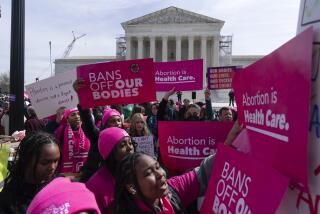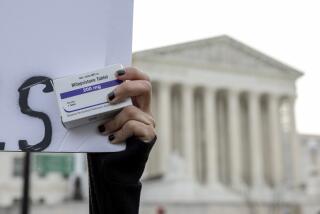Supreme Court critical of patents on human genes
WASHINGTON — The Supreme Court justices said Monday they were highly skeptical of the idea that a company or a scientist can hold a patent on human genes and prevent others from testing or using them.
“What about the first person who found a liver?” asked Justice Elena Kagan.
She was agreeing with other justices who said patents should not be given for “products of nature,” whether they are plant leaves that cure a disease or tiny parts of the human body.
Justice Stephen Breyer said patent law involves an “uneasy compromise” because it seeks to advance science and innovation by giving an inventor a temporary monopoly to profit from an advance.
If inventors devise a new use for a substance, they can patent this use, he said. But they cannot patent the underlying substance, he added. “It’s important to keep products of nature free” for use by all, he said.
During the argument Monday, most of the justices questioned the decision of the U.S. Patent and Trademark Office to grant Myriad Genetics a patent on two isolated gene sequences that signal a high risk of breast or ovarian cancer.
Chief Justice John G. Roberts Jr. said Myriad had simply “snipped” part of the gene sequence. It did not invent a new product, but simply found a way to isolate part of the human DNA, he said.
Because of Myriad’s patents, the Utah company has been able to profit from testing women who are concerned about their inherited risk of the two cancers.
Four years ago, breast cancer patients and medical researchers sued to challenge Myriad’s patents, arguing that human genes themselves could not be subject to patent protection.
These patents “cover the genes of every man, woman and child,” Christoper Hansen of the American Civil Liberties Union told the court. It “can’t be right,” he said, that a private company can hold monopoly control over genes from the human body.
A lawyer from Myriad argued that the company had devoted years of research to isolating the human genes and the mutations that are correlated with a high risk of cancer. “It would be dangerous,” he said, for the court to backtrack and to deny patents to innovators who make scientific advances using natural products.
But the justices did not sound convinced. “I don’t see how this is different from snipping,” Roberts said. If snipping the leaf of a medicinal plant could not be patented, snipping a gene sequence is not enough to obtain a patent either, he said.
This case of patients versus patents has drawn extraordinary interest because of its potential to reshape the law on biotechnology and personalized medicine.
For more than 30 years, the U.S. patent office has been granting patents to those who isolate living cells and make new uses of them, whether they are bacteria, plant seeds or human cells.
The biotech industry says these patents have spurred advances in medicine and agriculture. About half of the drugs in modern use and most anti-cancer drugs are derived from natural organisms, they say.
But the Supreme Court has grown increasing skeptical of patents and the apparent willingness of the U.S. patent office to grant inventors and innovators a 20-year monopoly over the use of formulas and processes.
Last year, the high court unanimously rejected a patent for a personalized medicine dosing formula that was held by Prometheus Labs. The justices said this formula, which relied on a blood test to guide doctors on the proper dose of a drug that treats auto-immune disorders, rested on a “law of nature” and therefore, could not be patented.
“Einstein could not patent his celebrated law that E=mc2, nor could Newton have patented the law of gravity,” said Justice Stephen Breyer. “Such discoveries are ‘manifestations of ... nature, free to all men and reserved exclusively to none’,” he added, quoting from a 1948 opinion.
The justices then issued a one-line order telling a federal patent court to take another look at the gene patents held by Myriad Genetics, the company based in Salt Lake City.
In 2009, the American Civil Liberties Union and Public Patent Foundation had sued on behalf of the cancer patients and medical professionals to challenge the validity of Myriad’s gene patents. They argued that giving one company a monopoly over a distinctive gene sequence resulted in patients paying too much for testing, and it prevented them from getting a second opinion from other medical experts.
But they lost in the federal circuit court that oversees patent appeals. It upheld Myriad’s patents in 2011, and it did so again last year, despite the warning from the high court. The patent judges held that the isolating of the particular gene mutation that signals a risk of cancer was a “new and useful” invention that can be patented.
Even though Myriad’s patents are due to expire within two years, the Supreme Court agreed to hear the ACLU’s contention that genes cannot be patented.
A decision in the case of Assn. for Molecular Pathology vs. Myriad Genetics can be expected by the end of June.
Follow Politics Now on Twitter and Facebook
More to Read
Get the L.A. Times Politics newsletter
Deeply reported insights into legislation, politics and policy from Sacramento, Washington and beyond. In your inbox three times per week.
You may occasionally receive promotional content from the Los Angeles Times.







